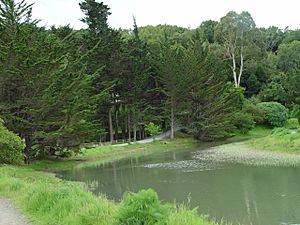Coyote Creek (Marin County) facts for kids
Quick facts for kids Coyote Creek |
|
|---|---|

Coyote Creek flowing through Tam Valley
|
|
| Country | United States |
| State | California |
| Region | Marin County |
| Physical characteristics | |
| Main source | Coyote Ridge 700 ft (210 m) 37°52′06″N 122°32′52″W / 37.86833°N 122.54778°W |
| River mouth | Richardson's Bay Tam Valley, California 0 ft (0 m) 37°52′59″N 122°31′08″W / 37.88306°N 122.51889°W |
Coyote Creek is a stream located in Marin County, California, United States. It flows through an area called Tamalpais-Homestead Valley, California (often known as Tam Valley). The creek starts on Coyote Ridge and travels about 2.5 miles (4 kilometers) eastward. It eventually empties into Richardson Bay, which is part of San Francisco Bay.
History of Coyote Creek Area
The land around Richardson Bay, where Coyote Creek flows, was originally home to the Coast Miwok people. Spanish explorers arrived in this area in 1775. One explorer, Juan de Ayala, sailed the first ship into San Francisco Bay. They named a nearby area "Saucelito" (meaning "little willows") because of the trees they saw from their ship.
Later, in 1817, a Spanish mission called Mission San Rafael Arcángel was established. In 1834, the Mexican government took control of the mission lands. These lands were then given as large grants, called ranchos, to important Californian families.
The Rancho Corte Madera del Presidio was one such rancho. Its name means "place where wood is cut for the Presidio." This rancho had a sawmill to process redwood trees. It also had farms for cattle and horses, a brickyard, and a stone quarry. The town of Sausalito, California became an important port. Ferries connected Marin County to San Francisco, and trains brought supplies from the north to be shipped across San Francisco Bay.
Wildlife and Nature
Coyote Creek has always been a home for many animals. In the past, California golden beavers lived here. Beavers build dams, which are like natural walls across the creek. These dams helped to clean the water by trapping dirt and mud. This made the creek a better place for young steelhead and salmon to live, especially during the summer.
 | Jewel Prestage |
 | Ella Baker |
 | Fannie Lou Hamer |

